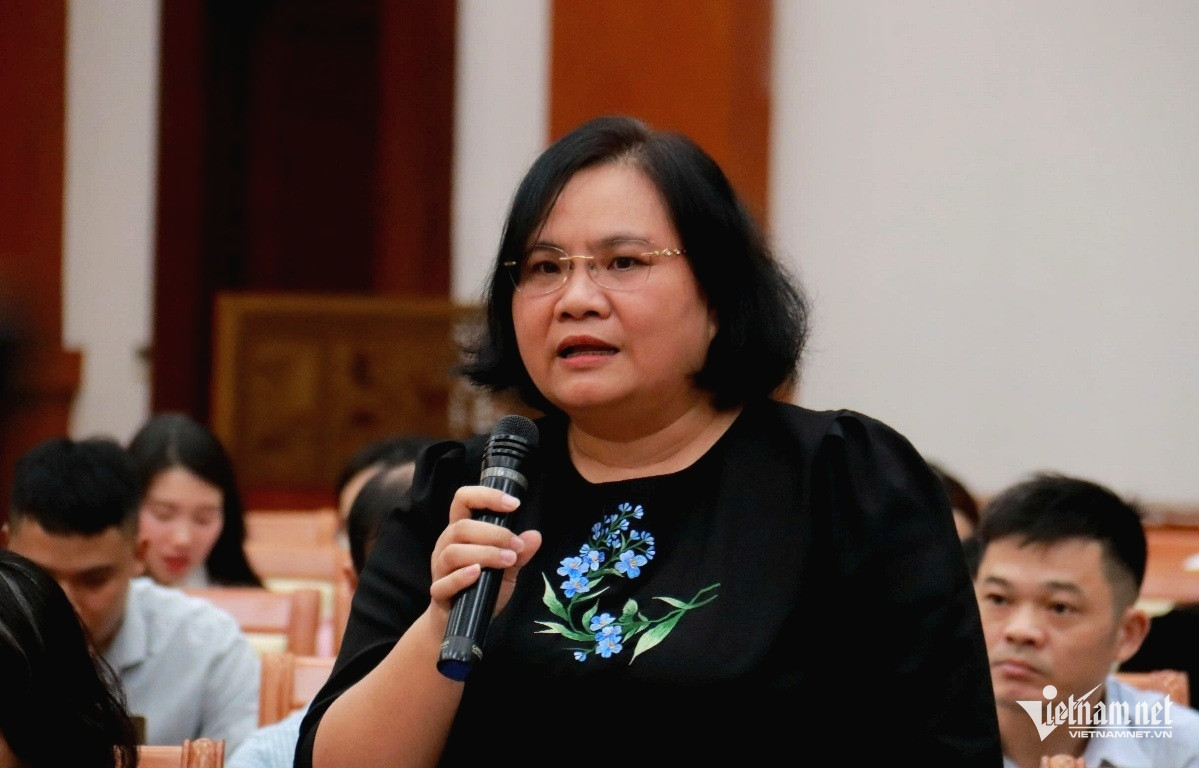
Nguyen Thi Chuc, a land and construction officer in Khanh Thuong Commune, Ba Vi District (now a specialist at the Ba Vi Commune Economic Division, Hanoi, as of July 1), told VietNamNet that under Decree No 45 (dated May 15, 2014) about land use fees, residents only had to pay 50 percent of the difference between residential and agricultural land prices for garden land adjacent to housing on the same land plot.
Under Decree No 103 (dated July 30, 2024) on land use and rental fees, people have to pay 100 percent of land use fees when changing the purpose of use from agricultural land, minus the agricultural land use fees or agricultural land rent.
Chuc noted that the significantly higher financial obligation has deterred many residents in the area from converting land, even after completing the procedures, due to the prohibitive land use fees.
This was the case for D.C.P in Minh Quang Commune, Ba Vi District (now Ba Vi Commune), who applied to convert 210.2 sqm of perennial crop land to residential land.
Under Decree No 103, the land use fee people have to pay upon land conversion is calculated as the difference between the residential land price and the perennial crop land price in the same price table.
In D.C.P’s area, the residential land price is VND4.4 million per sq m, and the perennial crop land price is VND63,000 per sq m, resulting in a difference of VND4,337,000 per sq m.
For 210.2 sq m, D.C.P would have to pay over VND911 million in land use fees, plus registration fees. For rural residents, this amount is unaffordable, and D.C.P could not pay it. Consequently, although the Ba Vi District People’s Committee (now Ba Vi Commune) had approved the conversion, it had to revoke and cancel the decision.
D.C.P’s case is not unique. VietNamNet previously reported on a resident in Nghe An who was devastated when faced with VND4.5 billion in fees to convert 300 sq m of garden land to residential land.
Tran Duy Dong and his wife Nguyen Thi Hong, residing in Hung Loc Ward, Vinh City (Nghe An), were deeply distressed when converting 300 sq m of garden land next to a cemetery into residential land. They were charged a land use fee of nearly VND4.5 billion. The family does not oppose paying taxes, but stated that such an amount is beyond their lifetime earnings.
Regulations need revision
Associate Prof Nguyen Quang Tuyen from Hanoi Law University told VietNamNet that the 2024 Land Law, which institutionalized Resolution 18, eliminated land price subsidies and established five land valuation methods, including one based on market principles.
However, Tuyen noted that some people misinterpret the regulation.
Some localities are setting prices per market prices, but this approach does not comply with the spirit of Clause 1, Article 158 of the 2024 Land Law. Determining “market prices” is challenging, especially given the current lack of transparency in the real estate market.
The new regulations have led to higher taxes and land use fees for residents converting land, Tuyen said. He emphasized that land prices should be determined based on market principles, not market prices, so as to harmonize the interests of the state, investors, and land users.
“Some key aspects of the law and its guidelines remain unclear. What are market principles? Are they the same as those in commercial transactions? What does the concept entail, what is its scope, and what specific criteria apply? How do market principles differ from market prices? The method for determining land prices based on market principles needs clearer regulations,” Tuyen said.
He noted that since the 2024 Land Law took effect on August 1, 2024, some provisions, particularly on land pricing relative to rural residents’ incomes, have proven impractical. A review and revision of certain regulations of the 2024 Land Law are necessary.
In the short term, Tuyen suggested applying the old pricing method for a certain period, possibly with an additional percentage or coefficient K tailored to each area, based on residents’ actual incomes. This would ensure affordability, especially in rural areas, and avoid “shocking” residents converting agricultural land to residential use.
Tuyen also recommended adjusting agricultural land prices by region. In suburban districts or areas with high urbanization and economic development, price adjustments could be considered.
Regarding land use fees for conversions, the Ministry of Finance, in a draft amendment to Decree No 103/2024 (on land use and rental fees) and Decree No104/2024 (on land development funds), proposed adding Clause 6 to Article 52 of Decree No103 to address transitional cases.
Nguyen Le